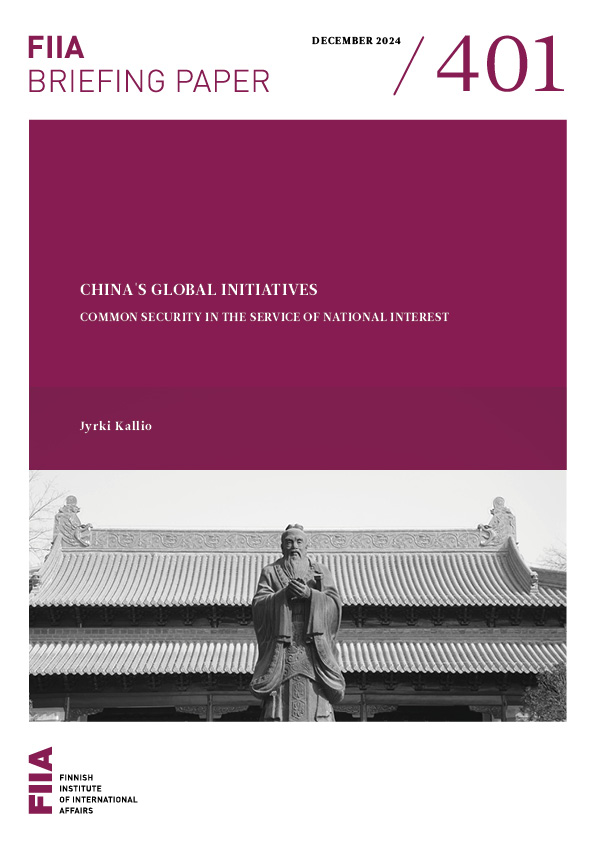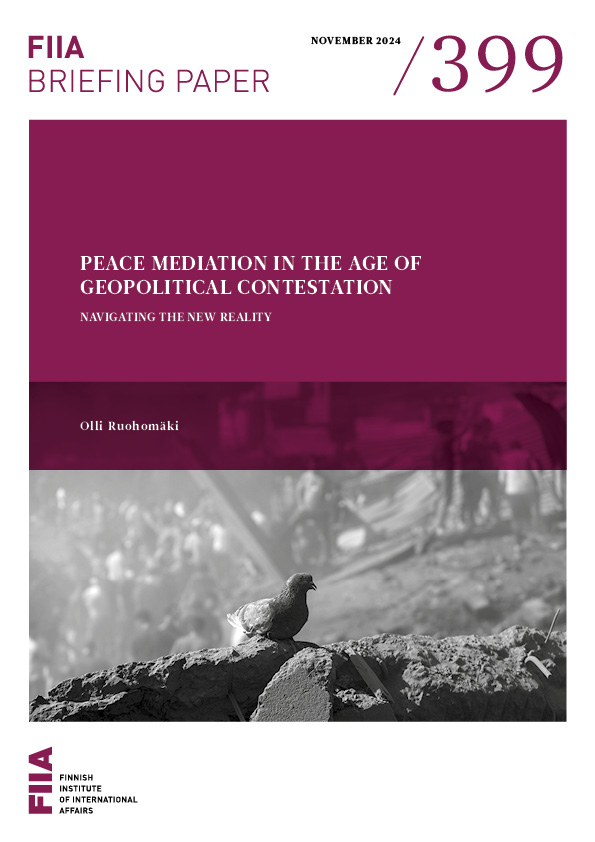The recent hostage crisis in the Middle East involving two Japanese citizens laid bare Japan’s attempts to implement a more active role for itself in international security, through a strategic use of development cooperation and by aiming to loosen the restrictions on Japan’s military in the long term.
Throughout the post-war era, Japan has consistently applied Official Development Assistance (ODA) as an effective mechanism for promoting its own national interests, for example through tied aid and by providing loans rather than grants.
The release earlier this year of a new Development Cooperation Charter clearly reveals the securitization of ODA, or the use of aid for a more rigidly defined strategic use.
The hostage crisis furthermore fuels the debate on a possible revision of Japan’s constitution, and breathes new life into the ruling Liberal Democratic Party’s long-cherished goal of revising Japan’s key charter.
While at first sight neither the securitization of aid nor the incipient debate on the constitution are marked by huge immediate changes, they nevertheless represent a significant incremental step towards the accomplishment of the ruling conservative party’s grand strategy and the new course it is mapping out for Japan.
In January this year during a six-day visit to the Middle East, Japanese Prime Minister Shinzō Abe pledged 200 million USD in humanitarian assistance for refugees and displaced persons from Iraq and Syria, and in support of Turkey and Lebanon. According to Abe, the goal was to “at least to some extent contain the threat posed by ISIL (Islamic State of Iraq and the Levant)”.1 Opposition parties criticized Abe for indirectly provoking ISIL, as the prime minister had been aware for two months that two Japanese citizens kidnapped in the region were being held hostage by the extremist rebel group.
As a result, ISIL demanded a ransom for the two Japanese hostages, for the same amount that Abe had pledged in aid. Both hostages were executed within two weeks. As a demonstration of its resolve to contribute to the anti-ISIL coalition, Tokyo announced in February that it would offer an additional 15.5 million USD to help fight terrorism in the Middle East and Africa. As a country that is constitutionally and tightly restricted from using its military force, Japan thus continues to make full use of “chequebook diplomacy”.
The hostage crisis clearly illustrated the direct link between development cooperation and security, an issue which now more than ever is at the core of the debate in Japan. Abe’s response to the hostage crisis received wide popular support, and his approval rating went up significantly after the crisis. A majority of the Japanese public seems to support Tokyo’s aid policy to the Middle East, even if most maintain that all aid should be non-military. At the same time it cannot be denied that the hostage crisis served to support two of the Abe administration’s top policy priorities: first, the securitization of Official Development Assistance (ODA), and second, a gradual shift towards a more assertive and proactive Japanese involvement in international security politics.
Japan’s development cooperation
Japan is the world’s second largest donor of ODA in gross terms, after the US. According to recent figures, in 2013 Japan attained fourth position among the Organization for Economic Co-operation and Development’s (OECD) Development Assistance Committee (DAC) members in terms of net ODA (the gross amount minus ODA loan repayments), after the United States, the United Kingdom and Germany.2 Notwithstanding this, Japan’s development contributions remain fairly modest in relative terms. The country’s ODA per GNI (Gross National Income), at 0.23% in 2013, is still markedly behind the UN target of 0.70% and well below the DAC average of 0.40%.3
Throughout the post-war period, ODA has functioned as an instrument for making amends for damage inflicted on other countries during Japan’s expansionist era, and also as a “carrot” to induce other countries to implement changes. In addition, ODA is an important tool for Japan as an aspiring “civilian power” to appeal to the international community by showing solidarity towards other countries and responsibility for the world. As a result, Japan is looking to increase its soft power and influence among developing nations. This is not unlike the development cooperation policies of the EU, a self-proclaimed civilian or normative power.
Most importantly, Tokyo has consistently applied ODA as a useful mechanism for promoting economic development and cooperation for its own benefit. Tied aid has long played an important role in this. Under this scheme, ODA loans are tied to conditions relating to the procurement of goods or services from the donor country, in this case Japan. Tied aid is therefore intertwined with Japanese trade and investment strategies, and serves to benefit Japanese corporations and national interests. Furthermore, since the 1970s Japan has consistently used its ODA to help secure its oil and gas imports, for example from the Middle East, through so-called resource diplomacy. Aid provided to the poorer Arab countries was intended to promote Japan’s relations with the richer oil-producing countries in the region. As another example, ODA, in the form of writing off overdue debts and issuing new low-interest loans, is currently a vital tool for re-launching the Japanese economic presence in Myanmar, and investing in burgeoning local business opportunities there.
Japan has often been criticized for the fact that, rather than focussing on the fight against poverty, it is primarily seeking to enhance its own national power by linking business interests with development. In order to deflect criticism, Japan has sought to frame foreign aid in terms of “enlightened self-interest”, indicating that Japan’s interests and global public interests are mutually overlapping. Furthermore, Japan has also adopted the EU’s civilian power rhetoric and, partly because of peer pressure from the DAC, has increasingly paid attention to social issues, human security and humanitarian aid.4
Supporting the “self-help” efforts of developing countries has been a further core philosophical underpinning of Japan’s ODA policy. This philosophy has in the first place been rooted in a strong market-oriented strategy, with a view to helping recipient countries to develop a market economy, and leading to a focus on infrastructure development and capacity-building. It has also resulted in an emphasis on low-interest, long-term loans instead of grants. For Tokyo, this has not only ensured that funds are used more efficiently, but has also enhanced the sustainability of Japan’s own development cooperation programme.
For example, according to the Nikkei Asian Review,5 Japan stopped providing yen loans to China in 2008, but China still has outstanding loans of up to 1.6 trillion yen (or approximately 13.4 billion USD) to be repaid in stages. Repayments from China are therefore providing an important source of income for Japan and a major funding source for new loans. It is the repayment of the ODA loans, not least from countries such as China, that currently boosts the Abe administration’s development strategy in the Middle East and Africa.
Securitizing aid
Putting ODA to strategic use in the broad sense, in other words using it to further Japan’s national interests under the banner of “enlightened national interest”, is therefore nothing new. Nevertheless, Japan’s defence and security policy, which has certainly stepped up a gear since Abe became prime minister for the second time in December 2012, also has ramifications for the country’s development cooperation. The securitization of ODA, or the use of aid for a more rigidly defined strategic use, is now more than ever embedded in Japan’s overall security policy.
Under the guidance of the newly-established National Security Council (NSC), it is Japan’s explicit goal to integrate ODA more with foreign policy and defence, bringing together the “three Ds” of development, diplomacy and defence. China’s more assertive geopolitical stance is an important background factor here. In order to allow for the export of defence equipment, in 2014 Japan revised its self-imposed restrictions on the joint development and export of weapons or military technology, turning the so-called “Three Principles of Arms Exports” into the “Three principles on transfer of defence equipment and technology”. Instead of the hitherto predominant all-out ban6, the new guidelines permit the export of defence equipment and technology in specific cases, and significantly loosen restrictions on arms exports to the US in particular.
Tying defence, diplomacy and development closer together has furthermore resulted in Japanese efforts to cement strategic alliances throughout Asia. In addition to its main security ally, the US, Japan has been wooing countries such as Australia and India, to increase its geo-economic power but also to tighten security cooperation. Member countries of the Association of Southeast Asian Nations (ASEAN) sharing Japan’s perceptions of threat in the light of an ascending China have equally been part of Tokyo’s charm offensive. Aid plays an important role, particularly in relations with countries which, like Japan, have territorial disputes with China. Concretely, this has been in the form of maritime security equipment including patrol boats to coastal nations in Southeast Asia such as the Philippines and Indonesia, or naval training in countries such as Malaysia and Vietnam.
Japan has always banned the use of ODA for military purposes. A first strategic document laying down Japan’s aid policy, the first ODA Charter,7 was released in 1992, just a few years after Japan became the world’s largest donor in 1989. In addition to the promotion of environmental protection, the Charter sought to endorse the crucial ideological dimension of Japan’s aid. The policy paper explicitly underlined the transition to market-oriented economic systems in conjunction with democracy and basic human rights and freedoms, while emphasizing human-centred development and the enhancement of individual welfare. At least as importantly, the document prohibited the application of ODA for military purposes.
The successor to this strategy paper was the updated 2003 Charter.8 Partly prompted by OECD criticism, this document introduced the perspective of “human security” in the fight against poverty, particularly in the light of the Millennium Development Goals (MDGs). The charter, while regarding Asia as Japan’s main focus, emphasized that Japan’s ODA aims to “contribute to the peace and development of the international community” but also that doing so would “help ensure Japan’s own security and prosperity”.
In order to further allow for a tighter link between aid and security, in February 2015 Japan revised its ODA Charter.9 The new text reveals a number of seemingly minor yet significant policy shifts. First, the document’s title no longer refers to “Development Assistance” but instead utilizes “Development Cooperation”. This is clearly in line with the convergence process referred to above, and the growing international consensus that development aid is not a one-way process. But at the same time the new title is clearly intended to drive forward Japan’s international cooperation under the banner of Prime Minister Abe’s declared goal to make his country a “Proactive Contributor to Peace”, and thereby secure Japan’s own national interests.
Second, the text explicitly regards development cooperation as a catalyst for private-led growth, which in turn should “lead to robust growth of the Japanese economy”. This factor is also reflected in the shift from Development Assistance to Development Cooperation, as is clear in the policy document’s title. Third, and just as importantly, the Charter allows Japan to provide aid to foreign armed forces, on the condition that the funds are used for noncombat operations such as helping private citizens and providing disaster relief. It is clear that ODA can now much more easily be supplied for strategic purposes, even if assistance is preceded by scrutiny “on a case-by-case basis in light of their substantive relevance” in order to ensure the non-military character of aid.
Justifying a more assertive military role
The recent hostage crisis also feeds into a second key policy goal of the Abe administration, namely a gradual loosening of the restraints on Japan’s military, with the ultimate goal of altering the constitution in order to allow for a more active role for Japan’s Self-Defence Forces.
Throughout the post-war period it has been a key policy goal of Abe’s Liberal Democratic Party (LDP) to establish an indigenous, rather than a US-imposed, constitution. In the revised 2013 edition of “Towards a Beautiful Country”, Abe’s personal manifesto, the prime minister reflects on a hostage crisis that occurred in 1977. In September of that year, the Japanese Red Army (JRA) hijacked a Japan Airlines passenger plane in India and diverted it to Dhaka, Bangladesh. The Japanese government gave in to the hijackers’ demands for a ransom and the release of JRA members held in prison. Japan’s negotiations with the hijackers drew widespread criticism.
Abe contrasts this with the hijacking of a Lufthansa plane in Somalia in the same year. The West German government at the time sent in a rescue squad that stormed the aircraft, eliminated the terrorists and successfully freed the hostages. Whereas Germany revised its constitution, enabling the protection of its citizens, Japan has not been able to lay a finger on its own constitution, which prevents Japanese Self-Defence Forces or police from getting involved in rescue operations. For Abe, the constitution, forcing Japan to trust “in the justice and faith of the peace-loving peoples of this world”, is a powerful symbol of the state’s powerlessness to protect the life, assets and territory of the Japanese people. The constitution is also a symbol of the LDP’s resentment towards Japan’s ongoing and US-imposed postwar regime.
The hostage crisis provides Abe’s conservative party, celebrating its 60th anniversary this year, with new firepower to accomplish its long-cherished goal of revising Japan’s key charter. In the aftermath of the crisis Abe delivered a passionate plea in the Japanese Diet to engage in a thorough debate on the constitution, and to instigate the greatest reform since the end of the war. In the media the prime minister has repeatedly stated that he considers several articles in the constitution outdated.
Furthermore, at its annual convention on 8 March 2015 the LDP adopted a strategy to rally support behind its plans for constitutional amendment. The party would seek to submit a number of motions after the elections in the House of Councillors in 2016, starting with proposals for revision on which other parties can agree relatively easily. Before that, however, the party will need to confirm the support of the Japanese public during the unified local elections in April this year. In a public opinion poll conducted at the beginning of this year, almost 30% of respondents, a record-high, supported boosting the defence capabilities of the Self-Defence Forces. However, other polls show that only approximately the same percentage of Japanese support constitutional revision, significantly less than the required majority.
The Japanese hostage crisis in the Middle East was strongly embedded in the ongoing transformation of Japan’s security policy. Development cooperation is increasingly defined in terms of security policy, as the new Charter reveals. The crisis also rekindled the debate on the need to amend Japan’s constitution. Neither the securitization of aid nor the constitutional debate is marked by immediate groundbreaking changes. Nevertheless, for the Abe administration and the conservative ruling party, they represent a significant incremental change towards the accomplishment of their grand strategy for a more assertive and internationally involved Japan.
Endnotes
1 My translation of the Japanese original. Speech delivered in Cairo, Egypt, 18 January 2015.
2 Japan is one of twenty-four members of the DAC. In order to qualify as ODA, the aid must promote the economic development and welfare of developing countries, and must have concessional financial terms, through the provision of grants or loans at below market interest rates. Technical co-operation is included in the aid, but grants, loans and credits for military purposes are excluded. The DAC conducts peer reviews of each member country’s development cooperation, approximately once every four to five years.
3 OECD (2014), OECD Development Co-operation Peer Reviews: Japan 2014, OECD Publishing. http://dx.doi.org/10.1787/9789264218161-en
4 It can be added here that, as the EU increasingly tends to prioritize self-interest, economic development and tied aid, a gradual process of convergence can be witnessed. Cf. Gaens, Bart and Vogt, Henri, “Sympathy or Self-Interest? The Development Agendas of the European Union and Japan in the 2000s”. The European Union and Japan: A New Chapter in Civilian Power Cooperation? Farnham: Ashgate (2015).
5 Nikkei Asian Review, Japan’s yen loans to rise on repayment from past borrowers, 20.1.2014.
6 Exceptions to the ban were, however, implemented on a few occasions to allow for collaboration with the US. See Gaens, Bart, Japan’s New Security Policy: Breaking Away from the Post-War Regime? FIIA Briefing Paper 148, February 2014.
7 Government of Japan, Ministry of Foreign Affairs, Economic Co-operation Bureau. Japan’s ODA Charter, June, 1992.
8 Government of Japan, Ministry of Foreign Affairs, Economic Co-operation Bureau. Japan’s Official Development Charter, August 2003.
9 Ministry of Foreign Affairs of Japan. Cabinet decision on the Development Cooperation Charter, February 10, 2015.






